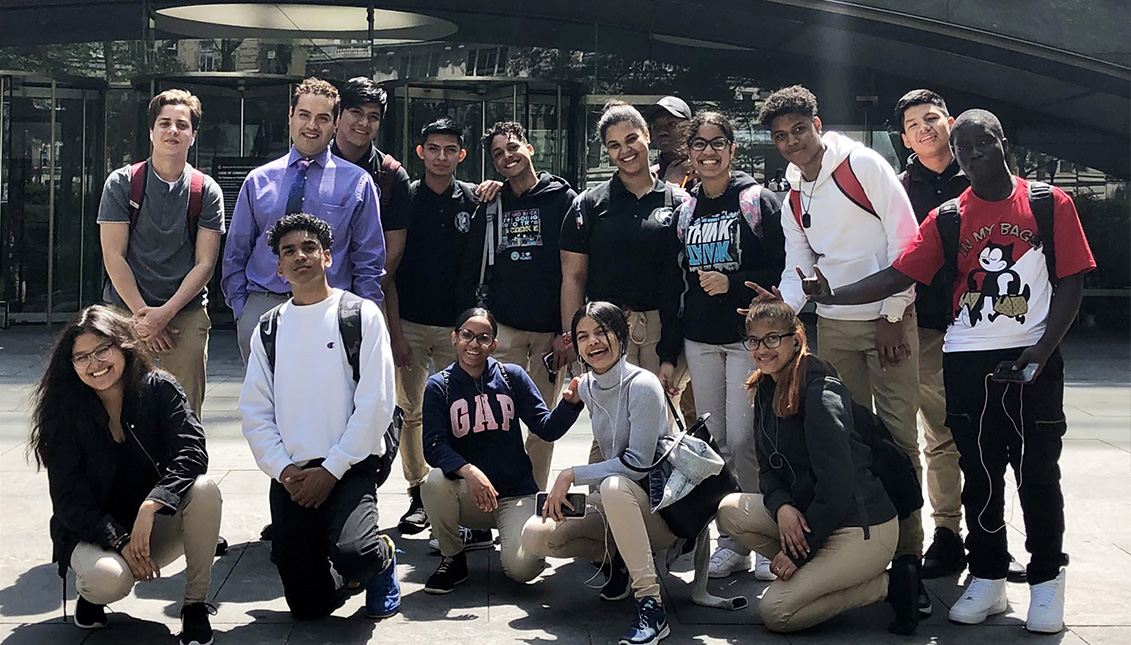
Bronx Latino student group leaves their "footprint" on Mars
Latinos make up only 8% of STEM professionals, but there is a shift of "galactic" proportions underway.
When NASA's Perseverance mission landed its rover on the red planet last February thanks to a team led by Diana Trujillo, it was a historic milestone for many reasons, including the fact that a planetary landing had never before been broadcast in Spanish.
In the race to find the origin of life on Mars and its future colonization, Trujillo managed to make Latinos, a community that carries a legacy of colonization and cultural assimilation in the country, aware that they have everything within their reach to be leaders in science and technology.
Professions, by the way, in which they currently represent only 8% of research teams.
But the Colombian scientist, whose story of overcoming the obstacles as a migrant who had to make her way in a country where those who have the most earn the most and achieve the most - a virtuous circle - is not the only one inspiring young Latinos to embark on STEM careers.
At the local level, in schools, there is also a "galactic" battle to awaken vocations.
With a surname that says a lot about him, Alejandro Mundo is a 29-year-old science teacher who teaches high school students at Kingsbridge International High School in the Bronx (NY).
A couple of years ago, Mundo had one of many brilliant ideas to motivate his students to take an interest in science: He got his 25 students to send their names to Mars in the rovers created for human exploration of the planet.
The teenagers thought it was a joke — NASA? Leave our footprints on Mars? But no, it was totally true. Suddenly, those same students, mostly Latino, felt part of the historic mission and became interested in space.
"The only way to change this in the future is to start with this current generation. So igniting a passion for science in my students is the key that I've seen that can make a difference," Mundo told NBC.
RELATED CONTENT
In addition to being a teacher, Alejandro Mundo is a research associate with NASA's GISS Climate Change Research Initiative. One day two years ago, he took his students on a field trip to the Center for Aerospace and Applied Mathematics in New York to show them how astronauts train and live on the International Space Station.
The fascination of the kids, many of whom had just entered the country and were learning English while attending classes, was total.
So much so that some of Mundo's students started their own science club called the " Worldology Club," where they visited museums, studied rocks, talked to scientists and went on trips related to STEM fields.
Now many of these kids are emerging as students pursuing careers in science and technology and thank their teacher for the inspiration and educational opportunity.
"I couldn't have this opportunity in my country; I feel like our teacher made it possible," said one of them, who is from the Dominican Republic. "It's very important for Latinos to get into this, because basically we can do a lot."
Mundo knows all too well how difficult it is for young immigrants to make their way in the country - he, too, came to the United States from Mexico at the age of 12 without knowing English, and had to deal with prejudiced adults who thought the teenager would end up cleaning toilets or working in a factory.
"I remember I told him: 'No, I'm going to college. I'm going to get a career, and I'm going to use this career not for my personal growth but to help others, specifically people like me,'" he explained to NBC.
"We can give a hand to the community. A lot of times I tell my students: 'You think you need money. You think you need all these resources,'" he said. "'But no, you can start where you are. You can create that impact locally, and we just made it to Mars!" Alejandro Mundo concluded.











LEAVE A COMMENT: